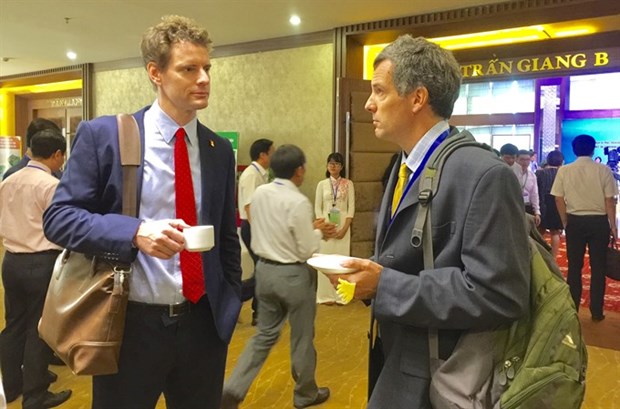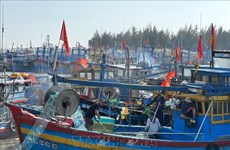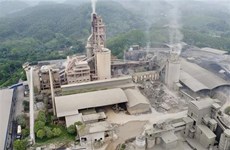Delta needs to address challenges, boost links
Experts have emphasised the need to address challenges and boost linkages for sustainable development in the Mekong Delta region.
 Participants of the conference (Photo: VNA)
Participants of the conference (Photo: VNA)Can Tho (VNA) – Experts have emphasised the need to address
challenges and boost linkages for sustainable development in the Mekong Delta
region.
Attending the Conference on Sustainable and Climate-Resilient Development of the Mekong Delta, which opened in Can Tho city on September 26, they agreed that the Mekong Delta is facing existential threats. According to studies, 39 percent of the delta could be underwater by the year 2100 and some areas of the coast are already eroding at a rate of 30 metres a year.
Early last year, the region suffered the worst drought in 90 years, which, together with rising sea levels, led to a heavy intrusion of saltwater into rice-growing areas. The mangrove forests along the coast, which protect the hinterland from floods and storms, are also in dramatic decline.
These problems threaten the future of the Mekong Delta and its ability to provide essential ecosystem services in which the communities of the delta and millions of people around the world depend.
Christian Henckes, Director of the Deutsche Gesellschaft fur Internationale Zusammenarbeit (GIZ)’s Integrated Coastal Management Programme in Hanoi, said the biggest risk was the land sinking into the ocean at a faster rate than ever. “The land has subsided by several centimetres each year, especially in Ca Mau, Soc Trang and Bac Lieu,” he said.
As the region faces rising sea levels, more land will be underwater. “I think we won’t lose the whole delta, but I also think that we can’t maintain it exactly as it is,” Henckes said.
“We should expect a common understanding on how our finances can be mobilised and how the government is going to spend them,” he added.
Because of the risk of land loss along the coast, Henckes said that “we need right now to protect the frontline of the coast against the sea, but also to figure out the second line of defense for 20-30 metres inside the area, just in case the first line breaks, to protect the people and villages.”
“We’ve been working on the Integrated Coastal Management Programme for nearly 10 years now. We began focusing on coastal protection and reinforcing the dyke system, as well as supporting the people who live behind the dyke to help them increase their incomes,” he said.
Now, the programme is focusing on agriculture and governance, getting provinces to work together, and investing in the projects that are needed most.
“This year, for example, we are working with Vietnam on a complete coastal protection plan for 720km of the Vietnamese coast,” he said.
According to Hermen Borst, deputy delta commissioner of the Netherlands Delta Programme, his country has developed a special programme with two goals related to climate change: flood prevention (the Netherlands is a highly urbanized area) and sufficient fresh water provision for the economy, now and in the future.
“We also have a special dedicated fund for the implementation of proposed measures,” he said.
The Mekong Delta, home to 17 million people, is Vietnam’s most important agricultural region. Producing 55 percent of the country’s rice, it feeds more than 245 million people worldwide.
The region is also the country’s third largest industrial region after the metropolitan areas of HCM City and Hanoi.
The conference is jointly organised by the Government Office and the ministries of Planning and Investment, Natural Resources and Environment, and Agriculture and Rural Development.
On September 27, the event continues with a speech by its chair, Prime Minister Nguyen Xuan Phuc.-VNA
Attending the Conference on Sustainable and Climate-Resilient Development of the Mekong Delta, which opened in Can Tho city on September 26, they agreed that the Mekong Delta is facing existential threats. According to studies, 39 percent of the delta could be underwater by the year 2100 and some areas of the coast are already eroding at a rate of 30 metres a year.
Early last year, the region suffered the worst drought in 90 years, which, together with rising sea levels, led to a heavy intrusion of saltwater into rice-growing areas. The mangrove forests along the coast, which protect the hinterland from floods and storms, are also in dramatic decline.
These problems threaten the future of the Mekong Delta and its ability to provide essential ecosystem services in which the communities of the delta and millions of people around the world depend.
Christian Henckes, Director of the Deutsche Gesellschaft fur Internationale Zusammenarbeit (GIZ)’s Integrated Coastal Management Programme in Hanoi, said the biggest risk was the land sinking into the ocean at a faster rate than ever. “The land has subsided by several centimetres each year, especially in Ca Mau, Soc Trang and Bac Lieu,” he said.
As the region faces rising sea levels, more land will be underwater. “I think we won’t lose the whole delta, but I also think that we can’t maintain it exactly as it is,” Henckes said.
“We should expect a common understanding on how our finances can be mobilised and how the government is going to spend them,” he added.
Because of the risk of land loss along the coast, Henckes said that “we need right now to protect the frontline of the coast against the sea, but also to figure out the second line of defense for 20-30 metres inside the area, just in case the first line breaks, to protect the people and villages.”
“We’ve been working on the Integrated Coastal Management Programme for nearly 10 years now. We began focusing on coastal protection and reinforcing the dyke system, as well as supporting the people who live behind the dyke to help them increase their incomes,” he said.
Now, the programme is focusing on agriculture and governance, getting provinces to work together, and investing in the projects that are needed most.
“This year, for example, we are working with Vietnam on a complete coastal protection plan for 720km of the Vietnamese coast,” he said.
According to Hermen Borst, deputy delta commissioner of the Netherlands Delta Programme, his country has developed a special programme with two goals related to climate change: flood prevention (the Netherlands is a highly urbanized area) and sufficient fresh water provision for the economy, now and in the future.
“We also have a special dedicated fund for the implementation of proposed measures,” he said.
The Mekong Delta, home to 17 million people, is Vietnam’s most important agricultural region. Producing 55 percent of the country’s rice, it feeds more than 245 million people worldwide.
The region is also the country’s third largest industrial region after the metropolitan areas of HCM City and Hanoi.
The conference is jointly organised by the Government Office and the ministries of Planning and Investment, Natural Resources and Environment, and Agriculture and Rural Development.
On September 27, the event continues with a speech by its chair, Prime Minister Nguyen Xuan Phuc.-VNA












